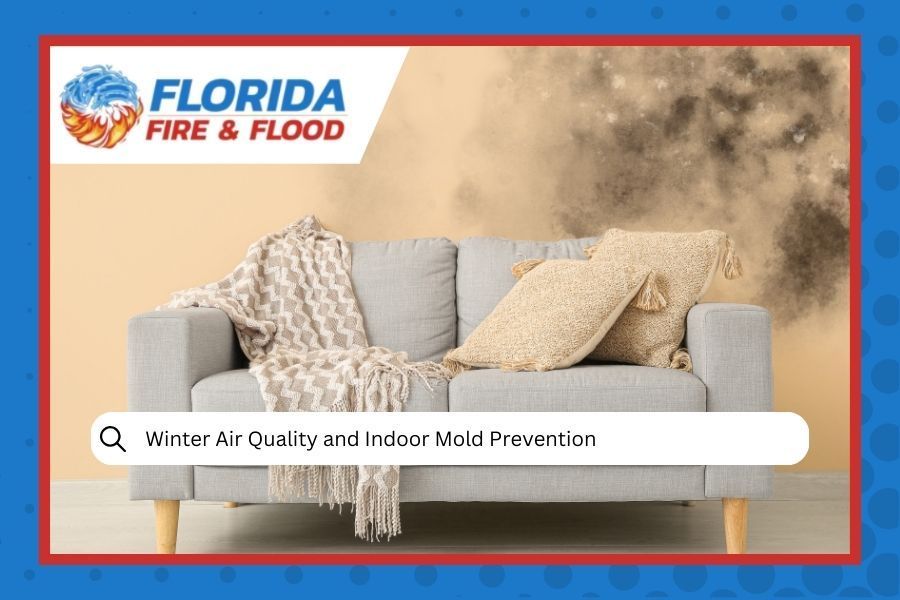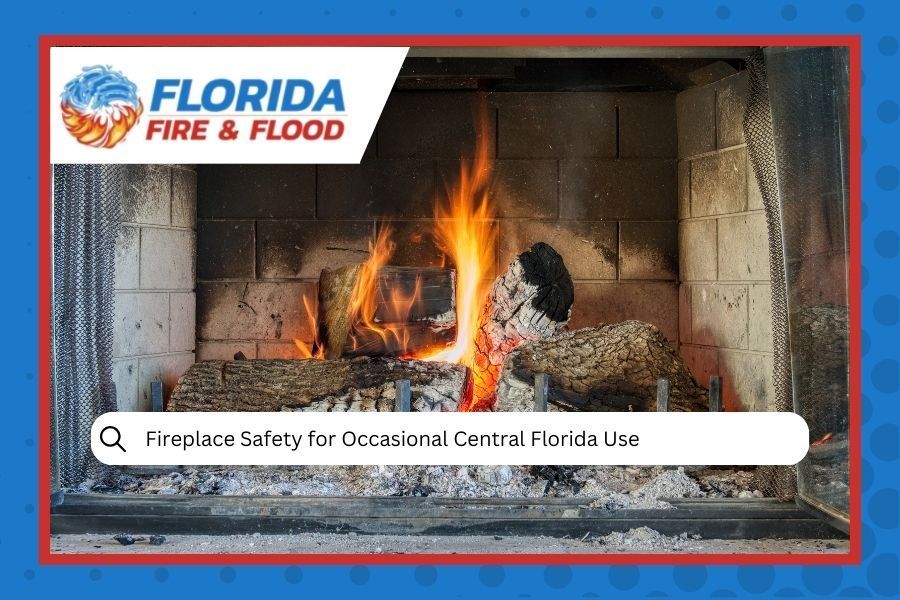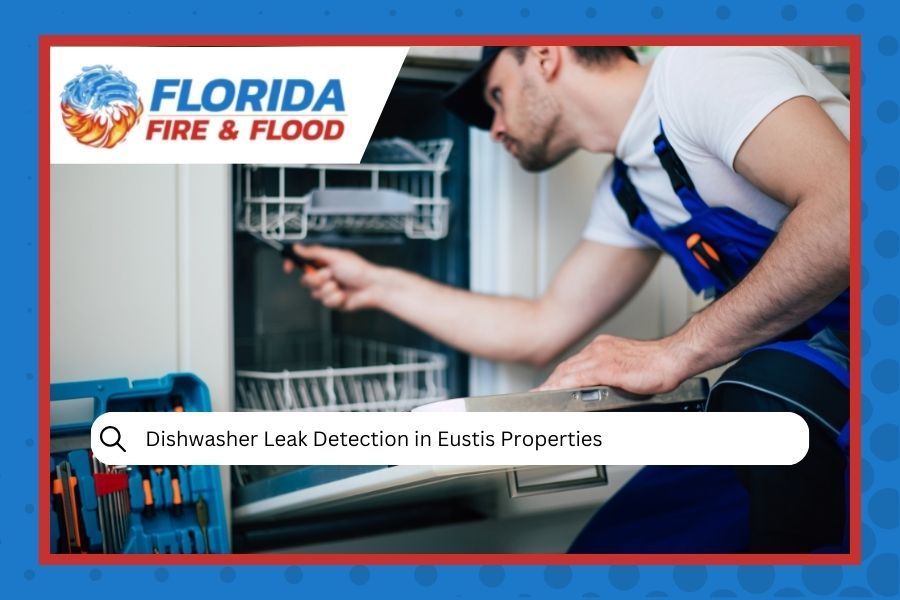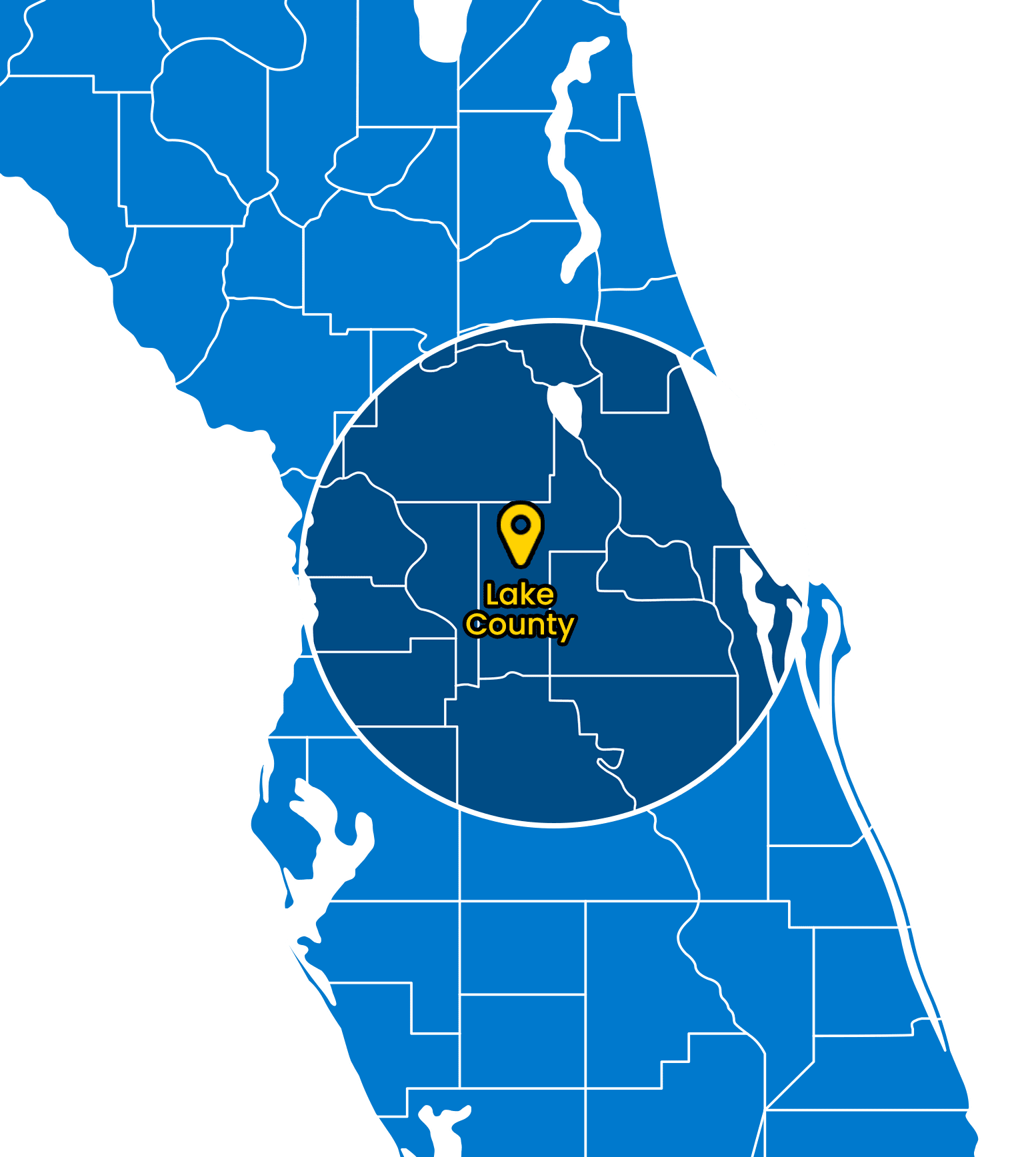AMRT - Applied Microbial Technician I, (Mold Remediation)
Jump to Section:
- Why Holiday Cooking Is Prime Time for Kitchen Fires
- The Most Common Holiday Cooking Fire Hazards
- Smart Kitchen Fire Prevention Strategies
- What to Do If a Cooking Fire Starts
- Holiday Cooking Fire Prevention Checklist
- Special Considerations for Central Florida
- When Prevention Isn't Enough
- Frequently Asked Questions
The holidays are nearly here, and you know what that means: family gatherings, festive decorations, and of course, a whole lot of cooking. But let's be honest, while you're juggling multiple dishes and trying to impress your in-laws with that turkey recipe you found online, your kitchen becomes a high-stakes juggling act. And when things get hectic, fire damage restoration is the last thing you want to be Googling on Christmas morning.
At Florida Fire & Flood, we've seen our fair share of holiday cooking disasters across Central Florida, from Mount Dora to The Villages. The good news? Most kitchen fires are completely preventable if you know what to watch for and take a few simple precautions. So before you preheat that oven or start frying anything, let's talk about keeping your kitchen (and your holiday) safe.
Why Holiday Cooking Is Prime Time for Kitchen Fires
Think about your typical holiday meal prep. You've got the oven running for hours, multiple burners going at once, maybe some deep frying happening, and let's not forget Uncle Bob wandering in to "help" while you're trying to keep everything from burning. It's basically a recipe for disaster, pun intended.
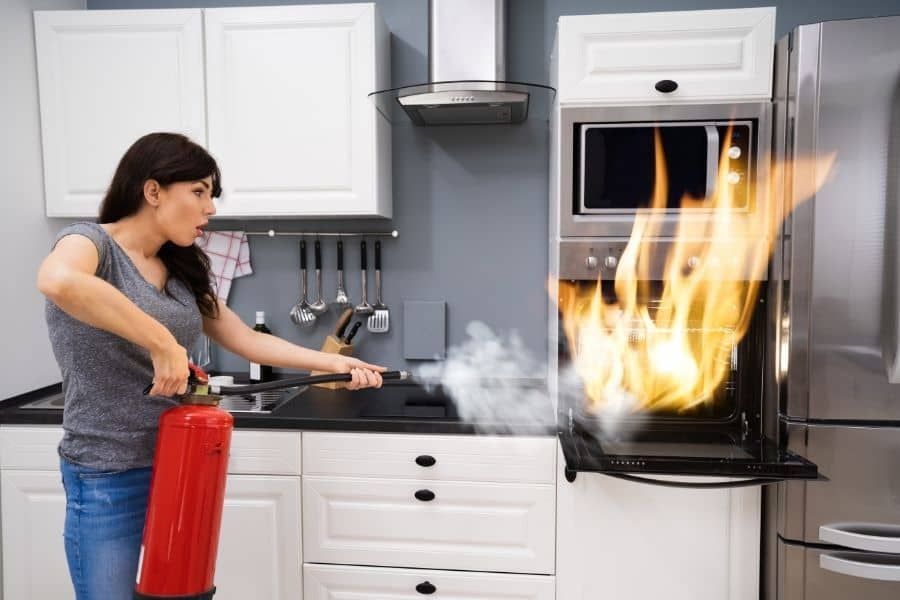
Holiday meal preparation often means multiple heat sources running simultaneously, increasing fire risk significantly.
According to the National Fire Protection Association , cooking is the leading cause of home fires in the United States, and the risk spikes dramatically during the holidays. Thanksgiving alone sees three times as many cooking fires as an average day. The combination of distraction, fatigue, alcohol consumption (we're not judging), and unfamiliar cooking methods creates a perfect storm.
Here in Central Florida, we might not deal with snow and ice, but our holiday cooking challenges are just as real. The combination of indoor cooking heat and our already warm climate means kitchens can get uncomfortable fast, leading to open windows, fans blowing near stovetops, and other risky setups.
Worried About Kitchen Fire Risk?
Our team at Florida Fire & Flood is here to help you understand fire prevention and recovery. We offer free consultations to discuss your home's fire safety and restoration needs.
Get Your Free ConsultationThe Most Common Holiday Cooking Fire Hazards
Unattended Cooking
This is the big one. You step away for "just a second" to answer the door, help with homework, or check on the football game, and suddenly that pot of gravy is smoking. Staying in the kitchen while you're cooking, especially when using the stovetop, is non-negotiable. If you absolutely must leave, turn off the heat first.
Turkey Fryer Disasters
Deep-fried turkey is delicious, but it's also one of the riskiest cooking methods out there. Overfilling the fryer, using it in the wrong location, or lowering a partially frozen turkey into hot oil can cause serious fires and severe burns. If you're going this route, do it outside, away from structures, and never, ever leave it unattended.
Grease Buildup
When you're cooking big holiday meals, grease and food debris accumulate fast. A dirty stovetop or oven isn't just unsightly, it's a fire hazard waiting for a spark. Take time between courses to wipe down surfaces and keep combustible materials away from heat sources.
Too Many Appliances, One Outlet
Running your slow cooker, electric roaster, mixer, and coffee maker all from the same power strip? That's asking for trouble. Overloaded circuits can overheat and cause electrical fires. Spread out your appliances across different outlets, and if you notice any flickering lights or warm outlets, stop using them immediately and call an electrician.
5 Steps to Take When You Discover a Cooking Fire
Turn Off Heat Source
If safe to reach, immediately turn off the burner or oven to stop adding fuel to the fire.
Cover Grease Fires
Slide a metal lid over the pan to smother flames. Never use water on grease fires.
Use Fire Extinguisher
Remember PASS: Pull, Aim at base, Squeeze handle, Sweep side to side.
Evacuate If Needed
If fire grows beyond control or you feel unsafe, get everyone out immediately.
Call 911
Once outside in a safe location, call emergency services and don't re-enter until cleared.
Smart Kitchen Fire Prevention Strategies for the Holidays
When you're preparing a big holiday meal, having a clear safety plan can make all the difference between a memorable feast and a disaster. The American Red Cross emphasizes that most cooking fires are preventable with proper preparation and awareness. Here's your go-to reference guide for keeping your kitchen safe throughout the holiday season.
| Safety Strategy | What to Do | Why It Matters |
|---|---|---|
| Create a Cooking Schedule | Write out a timeline for when each dish needs cooking | Reduces chaos and prevents forgotten pots, keeps you organized and focused |
| Keep a Clean Workspace | Clear countertops of flammable items near stove, store dish towels and paper away from heat | Prevents accidental ignition of combustible materials |
| Stock Safety Equipment | Keep a Class B or K fire extinguisher accessible, mount away from stove | Provides immediate response capability for grease fires |
| Monitor Smoke Detectors | Test monthly, replace batteries annually, ensure they're linked throughout home | Gives early warning and precious seconds to respond before fire spreads |
| Watch What You Heat | Use high smoke point oils (peanut, canola, vegetable) for high-heat cooking | Prevents oil from reaching ignition temperature, reduces flash fire risk |
| Practice PASS Method | Pull pin, Aim at base, Squeeze handle, Sweep side to side | Ensures you can use fire extinguisher effectively in an emergency |
What to Do If a Cooking Fire Starts
Despite your best efforts, sometimes fires happen. Here's what to do based on the type of fire:
Stovetop Grease Fire
Do NOT throw water on a grease fire. Water will cause the burning oil to splatter and spread. Instead, slide a metal lid over the pan to smother the flames and turn off the heat. Keep the lid on until everything cools completely. If you can't safely cover the pan, use your fire extinguisher.
Oven Fire
Keep the oven door closed and turn off the heat. The lack of oxygen should smother the flames. If it doesn't go out quickly or smoke is pouring out, get everyone out of the house and call 911.
Microwave Fire
(Yes, this happens.) Keep the door closed and unplug the microwave if you can do so safely. Never open the door until you're certain the fire is completely out.

Microwave fires can occur from overheating food or containers. Always keep the door closed and unplug the unit.
When to Evacuate
If a fire grows beyond a small, contained blaze, if you feel unsafe, or if you've used your fire extinguisher and the fire hasn't gone out, GET OUT. Your safety is more important than any meal or property. Close doors behind you to slow the spread, get everyone outside to your designated meeting spot, and call 911.
Holiday Cooking Fire Prevention Checklist
Let's make this easy. Print this list and stick it on your fridge before the holiday cooking marathon begins:
Before You Start Cooking:
- Test smoke detectors and replace batteries if needed
- Locate your fire extinguisher and verify it's not expired
- Clear countertops of flammable items near the stove
- Check that your oven and stovetop are clean
- Tie back long hair and avoid loose clothing
- Create a cooking timeline to stay organized
While You're Cooking:
- Never leave cooking unattended, especially with stovetop use
- Keep pot handles turned inward so they can't be knocked over
- Use timers for everything, don't rely on memory
- Keep children and pets at least three feet away from the stove
- Have a lid nearby when cooking with oil or grease
- Watch for overheating, if something smokes, turn down the heat
After You're Done:
- Turn off all burners and the oven
- Unplug small appliances
- Properly dispose of hot grease (let it cool and trash it, never pour it down the drain)
- Do a final safety sweep before going to bed
Special Considerations for Central Florida Kitchens
Living in Central Florida brings some unique considerations for kitchen safety during the holidays. Our homes often have open floor plans that look beautiful but can allow smoke and fire to spread quickly. Make sure your HVAC system's air filter is clean, a clogged filter reduces airflow and can contribute to smoke buildup.
Also, if you're planning outdoor cooking to keep heat out of the house, be mindful of afternoon thunderstorms that can pop up even during our "dry" season. Wet grills and electrical cooking appliances don't mix. Have a backup plan for bringing things inside if weather turns.
Many Central Florida homes have older electrical systems that weren't designed for today's cooking appliance demands. If your breakers trip frequently or you notice lights dimming when you run multiple appliances, have an electrician evaluate your system before the holidays. Better to invest in an upgrade now than deal with an electrical fire later.
If you're in the Ocala area , you know how quickly things can heat up in the kitchen, especially during those marathon holiday cooking sessions. We've helped numerous families in Ocala recover from preventable kitchen fires, and we'd much rather help you prevent one in the first place.
When Prevention Isn't Enough: What Happens After a Kitchen Fire
Even with all the precautions in the world, accidents can still happen. If you do experience a kitchen fire, the damage often extends far beyond what's visible. Smoke can permeate walls, cabinets, and ductwork. Soot settles on surfaces throughout your home. Water from firefighting efforts can cause secondary damage that needs immediate attention to prevent mold growth.
This is where having a trusted restoration partner makes all the difference. At Florida Fire & Flood, we specialize in complete fire damage restoration, from initial cleanup through final reconstruction. We understand the stress of losing your kitchen, especially during the holidays, and we work quickly to get your home back to normal.
Our team is IICRC certified and experienced in handling everything from small stovetop fires to complete kitchen rebuilds. We work directly with your insurance company so you're not stuck playing middleman while trying to figure out where you're going to cook Thanksgiving dinner. And because we're available 24/7, you can reach us any time, because kitchen fires don't wait for business hours. Learn About Our Fire Restoration Services
Understanding the Fire Damage Restoration Process
Fire damage restoration involves several critical steps. First, we secure your property and assess all affected areas, including places where smoke and soot traveled but flames didn't reach. Then we remove damaged materials, clean and deodorize everything salvageable, and begin reconstruction. The process can take anywhere from a few days to several weeks depending on the extent of damage, but we keep you informed every step of the way.
One thing many homeowners don't realize is that water damage from firefighting efforts often causes as much or more damage than the fire itself. Water can seep into walls, floors, and subflooring, creating conditions for mold growth if not dried properly. That's why fire restoration and water damage restoration often go hand in hand.
Real Central Florida Fire Restoration Stories
We've helped countless families recover from kitchen fires over the years. Recently, we worked with a family in Ocala whose stovetop grease fire spread to their kitchen cabinets during Thanksgiving prep. While the physical flames were contained to the kitchen, smoke damage affected most of their home. We were able to restore their kitchen and clean the smoke damage throughout the house in time for Christmas dinner.
Another case involved a complete house fire that required full restoration and rebuild. While this was more extensive than a kitchen fire, it shows our capability to handle projects of any size, from minor damage to complete reconstruction.
These aren't just houses to us, they're homes, memories, and gathering places. We understand the emotional toll a fire takes, especially during the holidays, and we're committed to making the restoration process as smooth as possible.
24/7 Emergency Fire Restoration Services
Kitchen fire damage requires immediate action. Our certified restoration team responds quickly to minimize damage and begin the recovery process. We're available any time, day or night, because disasters don't wait for business hours.
Call now: (352) 644-7969
Contact Us for Immediate HelpBeyond the Kitchen: Other Holiday Fire Hazards to Watch
While we're focusing on kitchen safety, it's worth mentioning other holiday fire risks. Candles, Christmas trees, string lights, and overloaded electrical outlets all contribute to increased fire danger during the holiday season. The U.S. Fire Administration reports that winter holidays are peak times for home candle fires. Never leave candles burning unattended, keep your Christmas tree watered, and don't daisy-chain extension cords or power strips.
If you use your fireplace during the holidays (yes, even in Florida we sometimes want that cozy ambiance), make sure it's been inspected and cleaned within the last year. Grease buildup can cause chimney fires that spread quickly to the rest of your home.
Your Holiday Kitchen Fire Prevention Takeaway
Look, we get it. The holidays are stressful enough without adding fire safety paranoia to the mix. But a few simple precautions can mean the difference between a memorable holiday feast and a disaster that ruins your entire season. Stay in the kitchen when you're cooking, keep flammable items away from heat sources, maintain your appliances and smoke detectors, and know what to do if a fire starts.
And remember, if the worst does happen, you don't have to face it alone. Our team at Florida Fire & Flood is here to help Central Florida families recover from fire damage, no matter when it happens. We're locally owned, family operated, and deeply invested in our community's safety and wellbeing.
This holiday season, let's keep the only thing smoking in your kitchen the food (and even then, just barely). Cook smart, stay safe, and if you need us, we're just a phone call away at (352) 644-7969. Now go make that holiday meal amazing, we believe in you.
Need immediate help with fire damage restoration or have questions about keeping your home safe? Contact our team at Florida Fire & Flood. We're here 24/7 to help Central Florida families when disaster strikes.
Frequently Asked Questions About Kitchen Fire Prevention
What should I do first if my stovetop catches fire while cooking?
Turn off the heat if safe to do so, then slide a metal lid over the pan to smother flames. Never use water on grease fires. If the fire is too large, evacuate immediately and call 911.
How can I safely deep fry a turkey without causing a fire?
Set up outdoors at least 10 feet from structures, never overfill oil, ensure turkey is completely thawed and dry, lower it slowly into oil, and never leave unattended. Keep a grease-rated fire extinguisher nearby.
How often should I clean my oven and stovetop to prevent kitchen fires?
Clean your stovetop after every major cooking session and deep clean your oven every three to six months. Before the holidays, do a thorough cleaning of both to remove grease and food debris buildup.
What type of fire extinguisher should I keep in my kitchen?
Use a Class B (for grease fires) or Class K (kitchen-specific) extinguisher. Mount it in an accessible location away from the stove and check the pressure gauge regularly. Replace or recharge according to manufacturer instructions.


